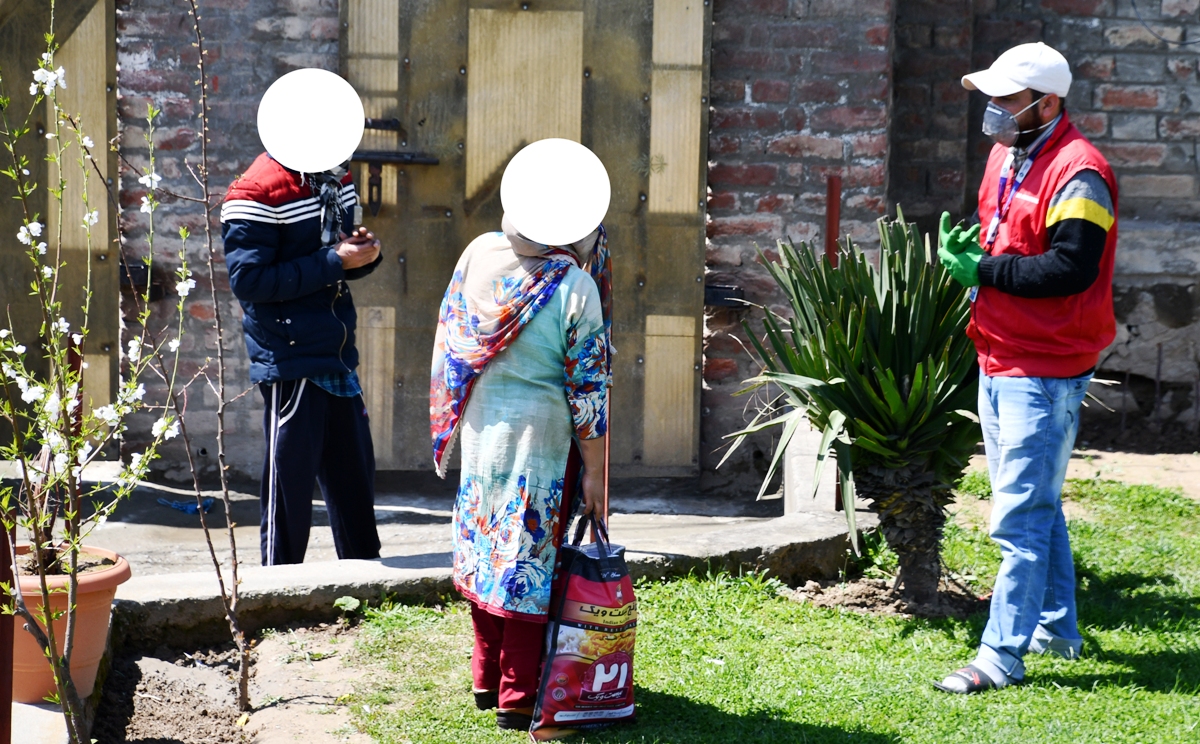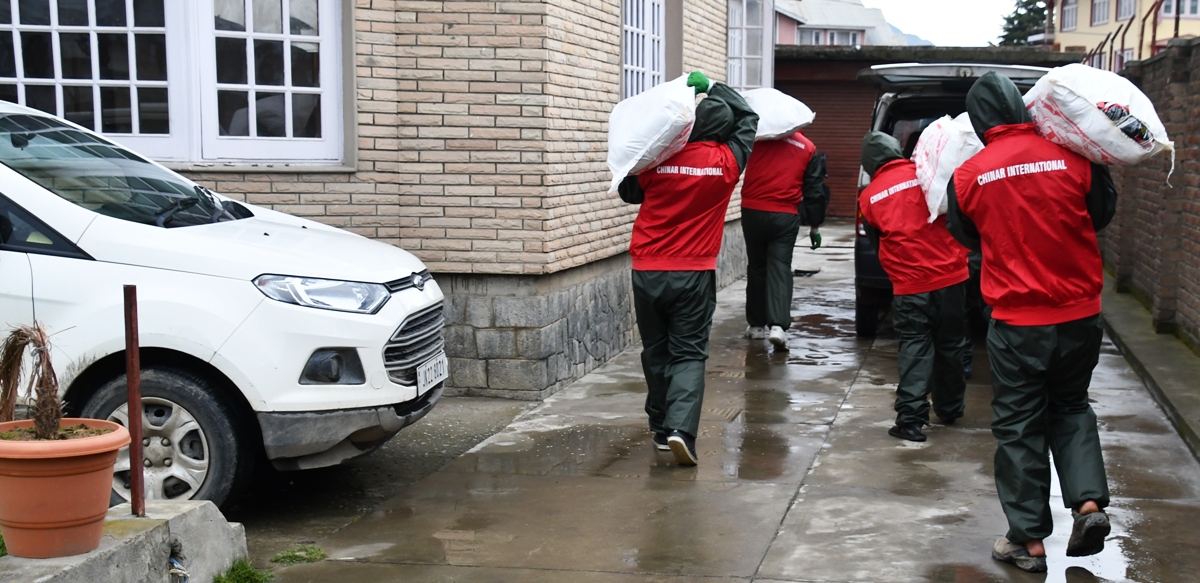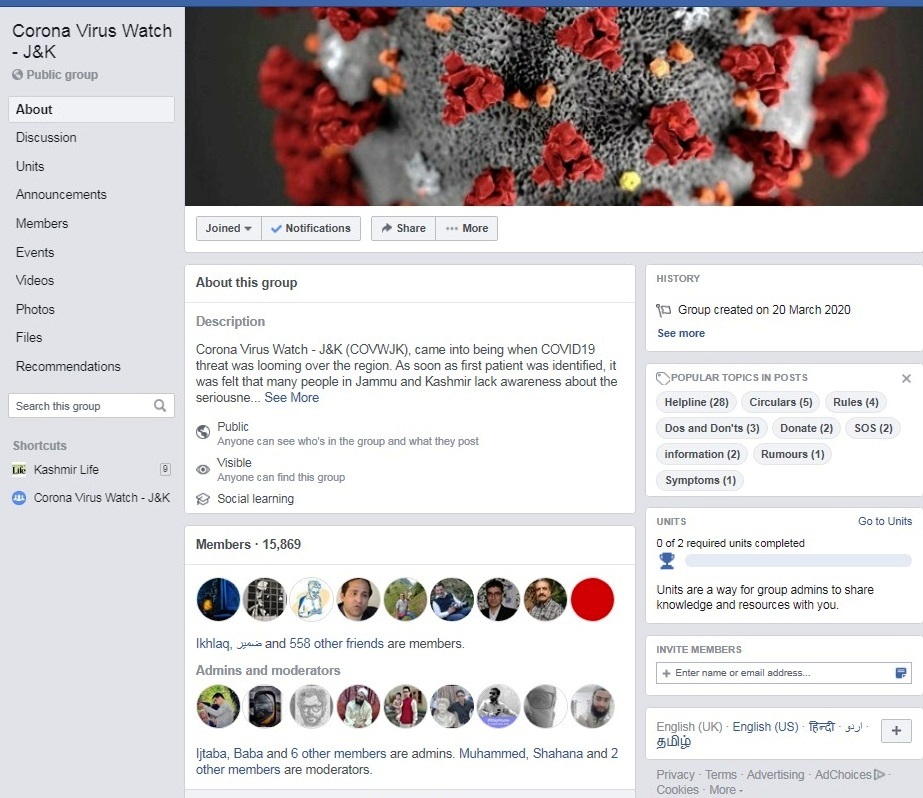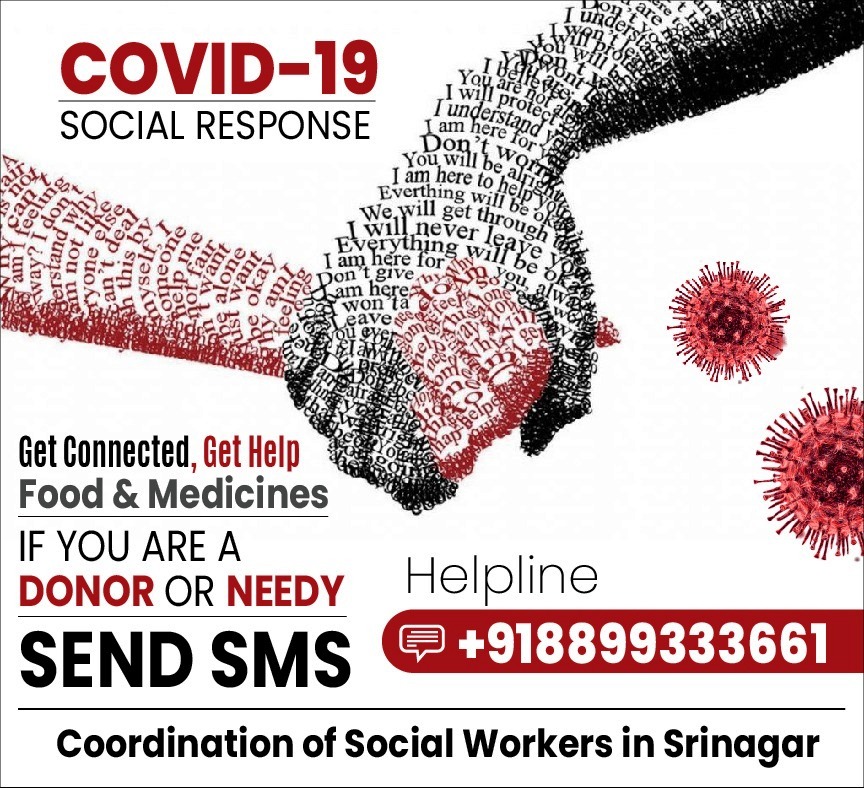Lockdown is witnessing outpourings of generosity in Kashmir towards poor and needy. Many NGOs, civil society groups are helping feed families during the Coronavirus outbreak, while others are providing medical supplies, reports Shams Irfan

On March 25, the first day of the three-week-long lockdown, Mubashir Wafai, 47, called his close friends with an idea to mobilize help for the needy. After a few hours of brainstorming, it was decided to provide existing charities with a common platform so that resources are utilized effectively without duplicating efforts.
The same day, Wafai, a Srinagar based entrepreneur created a Whatsapp group and began adding his close friends.
The group now has over 130 people representing 80 charities including local Bait-ul-Malls, Non-Government Organizations (NGOs), small volunteers groups, and likeminded individuals working in Srinagar municipal limits.
The group called Srinagar Network works as a link between those who are in need and those who can extend help. “When the lockdown was announced, I could sense where things will head in coming days,” said Wafai. “The basic idea is to ensure that nobody should go to bed hungry.”
Wafai’s group helped organizations like Athrout, Yateem Foundation, Kashmir Welfare Trust, Infaaq Foundation and many others pool their resources and reach out to a maximum number of people. “Without a common platform, most of the NGO’s and local organizations ended up helping the same family or person over and again,” said Wafai. “We wanted to make sure that they reach the maximum number of people.”

Last week, details of a family in distress, who was in need of Rs 18000, were circulating on Facebook and other social media sites. Because of the lack of coordination, people ended up pooling over Rs 1.5 lakh within 24 hours. The details are still doing rounds on social media and people are continuously helping.
“We appreciate people’s contribution,” Wafai said. “But imagine, this amount could have saved ten families survive for a month instead of just one. That is why the streamlining of resources is necessary.”
Since then Wafai and his friends cross-check every detail before posting it in their group.
On an average Wafai’s team receives over fifty distress calls on their dedicated helpline number. “These calls are from people who want us to help a particular family or a locality,” said Wafai. “After cross-checking from local Bait-ul-maal, we ask charities to take care of them.”
Within 48 hours, food and medicines get delivered to the family or locality. “But without volunteers it is impossible,” said Wafai, who relies on his friends for donations and groundwork. “When I called them to help with this, they were more than happy.”
Among the first ones to get a call from Wafai was Atif Rashid Chesti, 36, Srinagar based businessman, who is actively involved with the relief work.
“It is impossible for every organization to reach everywhere. So the only way out is to share resources,” feels Chesti.
Last week, a local Bait-ul-Maal (community fund), in Srinagar outskirts had spare 200 food packets after days’ distribution. The same day, an NGO working in Srinagar, was short of food packets, as they came across a large group of non-local labourers. “They called us for help and we put them in touch with each other. This resolved the issue immediately,” said Chesti.
As the word got out, a number of local organizations are keen to join hands.
Virtual to Real
What started as a Coronavirus awareness page on Facebook, Covid Watch Kashmir (CWK) has already run a successful donation camping among its 17 thousand followers.

Started by a Srinagar based businessman to make people aware of the dangers of Coronavirus, CWK saw its popularity rise within a weeks’ time. To handle the flow of messages, the group has a core team of ten people including doctors, businessmen, journalists, academicians, and social workers. Initially, they used to moderate and cross-check messages posted on the group’s page by its followers.
But after getting a number of requests from frontline health workers, seeking Personal Protective Equipment (PPE), the group’s core members decided to take their operations into the real world. “We sought donations from our followers for procurement of equipment for medical staff and the response was overwhelming,” said Mehrajdin Bhat, 31, Assistant Professor at Islamic University of Science and Technology (IUST). “Within no time we collected around 7 lakh rupees.”
In order to work on the ground, the online group tied up with an NGO named SRO Batmaloo. The said NGO will help CWK distribute 150 semi-protective gears as PPE are not available.
Apart from that CWK is distributing 60 monthly ration kits among 60 families identified and verified by its volunteers.
“Given the lack of manpower we are helping SRO Batmaloo with procurement and distribution of these kits,” said Mehrajdin, one of the volunteers.
Recently, CWK got distress calls from doctors working in Jammu hospitals as they lack PPE and other necessary equipments. “We are in a process to help them,” said Mehrajdin. “Also, we get calls from patients seeking medicines and help to reach hospitals. In coming days we will be more proactive.”
Helping Hands
Since 2008, Yasir Hayat, a businessman from Srinagar’s Rainawari would collect monthly donations from his friends and relatives and distribute it among needy. He would work under the banner of Helping Hands of Islam.
“With that money, we used to take care of around 100 families in our locality,” said Hayat.
The group used to provide them with monthly food kits and also help them monetarily, depending up the need and condition of the family.
But since the lockdown, new families are added to the list every day. “In the last three days, we have 20 new families on the list. Our target is to reach 1000 families by the end of this month,” said Hayat.
Now, Hayat is busy making special food kits which will have soaps, two sanitizers, five face masks, adult diapers apart from regular flour, different spices, salt and cooking oil.
However, given the lockdown, procuring material for the food kits and distributing it is a challenge.
“We have placed an order for flour at a mill in Pampore, but we don’t have the necessary permission to move out,” said Hayat. “We have requested officials for a pass but no response from them yet.”
Soothing South
Among the first ones to respond to people’s distress calls in Anantnag was Salfia Foundation (SF).
Working from Jamia Ahle-Hadees, Sherbagh, since 1986, the organization got traction in the area since last one decade. “We have 48 active members who are also primary donors,” said Bilal Ahmad Talak, Chairman of the Salfia Foundation. The members include retired government employees, businessman, teachers, doctors and other professionals.
As part of its routine work, Salfia Foundation has 102 families registered with it, who get monthly ration and other financial assistance. The group also owns 28 oxygen concentrators and one ambulance.
On Sundays, Salfia Foundation bears expenditure of critical patients who cannot afford treatment. For a dialysis patient, two sessions are paid and for a chemotherapy patient, it is three sessions.

Since the lockdown, Salfia Foundation immediately set aside Rs 6 lakh from its kitty for Coronavirus relief. “The aim is to help daily wagers who are hit the hardest,” said Talak.
So far 86 families have been identified and helped. “In some cases, where the condition of the family was really bad, we transferred some money directly into their accounts or sent it by hand through our volunteers,” said Talak.
Apart from that monthly food kits are prepared by the group’s volunteers for another 100 families. “Given the lockdown, things are moving at a slow speed,” said Talak. “But I am sure we will distribute food kits in a few days.”
Long Term Plan
In Srinagar, Wafai is happy with his team’s efforts, but given the magnitude of the crisis, he is keeping his fingers crossed.
“We live with the myth that nobody sleeps on an empty stomach in Kashmir. People are literally devastated this time,” said Wafai. “I want to prepare all charities for the worst-case scenario. If lockdown continues for one more month, you will have middle class merging into the lower class.”
Wafai draws his conclusions from his experience while working in Srinagar’s hardest-hit areas like downtown, Qamarwari and Noorbagh.
In a week’s time, Wafai’s group has reached out to around 400 individuals and provided food packets to 200 people on a daily basis. But he believes the numbers will increase dramatically as days pass. “We have to be prepared for that situation,” warns Wafai.
Experience Matters
In the aftermath of September 2014 floods, Chinar International, a subsidiary of a US-based NGO working under the same title there, pressed its entire manpower into action. After months-long efforts, Chinar International ended up reaching out to over 90 thousand families scattered across Kashmir. The same mechanism was put in place to help needy in post-July 2016 and post-August 2019 situations.
So, when the recent lockdown was announced Chinar International’s Srinagar office swung into action once again.

“Our experience tells us that daily-wage labourers, vendors, kiosk owners, auto drivers have savings just to last them for five days at max,” said Javeed Ahmad Hajam, 32, Operations Manager, Chinar International.
Since then Chinar International has already distributed over 500 food kits that contain one month’s basis provisions for a family of five. The NGO is hopeful to reach a target of five thousand kits per months. “We know it is going to get worse only. So we are trying to broaden our bases,” said Hajam.
These food kits are distributed through NGO’s network of bases offices in Kulgam, Shopian, Pulwama and Kupwara. “We have around 30 people working in these bases offices’ for delivery of food kits,” said Hajam. “Without a good network delivery is impossible in such times.”
Two days back NGO’s central office in Hyderpora got a distress call from a lady residing 45-kilometres from Shopian town. “Her family had literally nothing to eat for dinner,” said Hajam.
To make sure that the family doesn’t sleep hungry Hajam instructed one of his staff members to drive to the said village in the evening. The food kit was delivered within two hours of receiving the distress call. “There are hundreds of such families across Kashmir who cannot reach out because of taboo or lack of information” said Hajam.
In order to widen their reach in the current situation, Chinar International collaborates with a number of other charities and local Bait-ul-malls.
A few days back, a local Nowgam based Bait-ul-mall started helping poor and needy families from their limited resources. When the word got out about Bait-ul-mall’s work, they were flooded with distress calls. That is when the elders handling the Bait-ul-mall contacted Chinar International and sought their help.
“After confirming their credentials we provided them with food kits for distribution in their area,” said Hajam. “This small collaboration saved us time and energy.”
The focus of the NGO is to reach out to the hardest-hit areas in Srinagar, as most of the daily wagers live in HMT, Fateh Kadal, and other parts of downtown.

“We have currently three teams working in these areas. All of them are busy with the distribution of food kits and verification,” said Hajam. “The fourth team is tasked to procure essentials for the distribution.”
Given its past work and familiarity with the ground Chinar International’s Whatsapp helpline gets around 500 distress calls on a daily basis, which is a huge jump compared to 2014, 2016 or 2019.
“The situation is completely different this time. Even during strict curfews, construction work in interior localities and far off villages never stopped. Even vendors could venture out once in a while,” said Hajam. “Nobody buys from vendors anymore. In fact, people don’t let strangers come near them.”
Knowing the situation could go out of control any time, people offering helping hands are racing against time to reach out to every family in need.
“If it continues, people will soon fight for food. That is what we don’t want to happen. That is our main challenge,” said Wafai.
Note: Most of the volunteers working on ground refused any visual detail of their operations.















